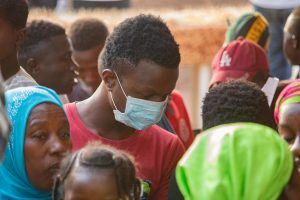Civic Space as a Key Prerequisite of Open Government Reforms in the MENA Region
This blog is part of IRM Week: A Year in Review. Throughout the week, the Independent Reporting Mechanism (IRM) will share findings and analysis from recent reports through a series of events, report launches blogs, and fact sheets. Learn more here.
Since joining the Open Government Partnership, Jordan (2011), Morocco (2018) and Tunisia (2014) – the three OGP country members in the Middle East and North Africa (MENA) region – have made over 129 commitments. These have included strong commitments on improving access to public information and open dataBy opening up data and making it sharable and reusable, governments can enable informed debate, better decision making, and the development of innovative new services. Technical specifications: Polici..., which can be effective transparencyAccording to OGP’s Articles of Governance, transparency occurs when “government-held information (including on activities and decisions) is open, comprehensive, timely, freely available to the pub... More tools to hold the government to account.
When it comes to implementing commitments, however, both Jordan and Tunisia fall behind other OGP members, and the results of Morocco’s first OGP action plan have yet to be assessed by the Independent Reporting Mechanism (IRM). That said, there has been small albeit promising progress made.
Jordan has used its OGP action plans to address challenges in implementing its 2007 Access to Information Law, which was the first in the region. While the law is problematic due to wide exceptions for release of public information, it underwent a review recently (which has not yet resulted in amendments). In its most recent action planAction plans are at the core of a government’s participation in OGP. They are the product of a co-creation process in which government and civil society jointly develop commitments to open governmen..., Jordan has focused on creating the administrative procedures and monitoring tools necessary to implement the existing provisions of the law.
Tunisia’s commitment to modernize the regulatory framework on freedom of information led to the creation of the Access to Information Authority, which provides grievance mechanisms in case a request for information is denied.
The ultimate impact of commitments to fight corruption and improve delivery of public services will hinge on citizens’ ability to hold the government to account on these important promises. For example, disclosure of information will not clean up government procurement in Tunisia unless civil society is empowered to detect violations and speak up about corruption risks in contracts. Similarly, for freedom of information rules in Jordan to contribute to uncovering misuse of public funds, a pluralistic and independent media is essential.
Civic space underpins effective implementation of all these open governments reforms. But of the three OGP members in the region, only Jordan has made notable commitments in this area. In its latest action plan, Jordan has pledged to improve the media and civil society operating environment and promote dialogue with civil society. These issues need to be addressed both inside and outside of the OGP framework. Since the next round of action plans will be implemented in an environment radically changed by COVID-19, they should also address recent challenges arising from the epidemic, as well as more fundamental problems for media freedoms and civic space.
Priority areas for reform across these three countries include:
- In Jordan, civil society continues to face a variety of significant restrictions, including burdensome registration and regulatory requirements for associations, interference with those exercising rights to expression and peaceful protest, and restrictions on online expression and access to websites. In response to the COVID-19 crisis, Jordan has mobilized the Defense Act of 1992 to curb gatherings and movement within the country, limit the ability of health officials to speak with the press, and ban the sale of newspapers, all without significant consultation with civil society. Jordan could commit to addressing these restrictions in its upcoming action plan. Particularly feasible and impactful commitments could focus on: (1) liberalizing access to foreign funding by civil society organizations (CSOs) and simplifying the approval process required to access such funding; and (2) institutionalizing public participationGiving citizens opportunities to provide input into government decision-making leads to more effective governance, improved public service delivery, and more equitable outcomes. Technical specificatio... in the development of policies and responses to public health crises.
- In Morocco, notwithstanding progressive provisions in the 2011 Constitution concerning civil society and human rightsAn essential part of open government includes protecting the sacred freedoms and rights of all citizens, including the most vulnerable groups, and holding those who violate human rights accountable. T..., CSOs and activists continue to face ongoing difficulties with CSO registration, state interference in CSO operations, and limitations on fundraising. In its next action plan, Morocco could: (1) amend the decree on associations to facilitate registration and limit government interference with CSO operations; (2) revise a draft law on fundraising to simplify licensing, appropriately tailor oversight requirements, and reduce limitations and penalties on the use of the funds; (3) enact an actionable legal framework mandating and supporting public consultations on government policies; and (4) promote the availability of preferential taxPlacing transparency, accountability, and participation at the center of tax policy can ensure that burdens are distributed equitably across society. Technical specifications: Commitments related to c... treatment for CSOs.
- Though Tunisia has seen a significant flourishing of the freedoms of speech, expression, and assembly since the 2011 Revolution, civic space continues to face substantial restrictions. CSOs are still subjected to complex registration requirements and are often unable to access tax exemptions or banking services. Protests during the COVID-19 pandemic have been dispersed using excessive force, and social media users and influencers have been arrested. Tunisia should address these restrictions on civic space in its upcoming action plan, by: (1) revising restrictive provisions limiting assemblies on public order grounds; (2) imposing appropriate limits and accountability mechanisms regarding the use of force in policing protests; and (3) liberalizing legal and regulatory provisions criminalizing online expression.
Through the OGP co-creation processCollaboration between government, civil society and other stakeholders (e.g., citizens, academics, private sector) is at the heart of the OGP process. Participating governments must ensure that a dive..., Jordan, Morocco, and Tunisia can build on recent progress by working with civil society partners to lift key civic space restrictions. With an enabling environment for civil society, these OGP members can enable public participation and promote the sustainable achievement of open government reforms.
Comments (1)
Leave a Reply
Related Content

IRM Week: A Year in Review
Explore webinars, blogs and fact sheets that spotlight new IRM findings, highlight action plan success stories and reforms that have gained traction, and discuss existing challenges and opportunities.
 Challenges and Solutions
Challenges and Solutions
Leveraging OGP for a Transparent COVID-19 Response in Africa
Like governments around the world, African countries have shifted enormous resources to respond to the COVID-19 pandemic. Given such massive spending, fiscal transparency is more important than ever to minimize…

A Guide to Open Government and the Coronavirus: Civic Space
Governments are taking exceptional steps in response to COVID-19, such as enforcing social distancing and quarantine measures. Prohibitions against in-person gatherings have had a dramatic impact on civic space across…


Nicholas Reply
Another great story by Ms Ninua! Keep up the good work!